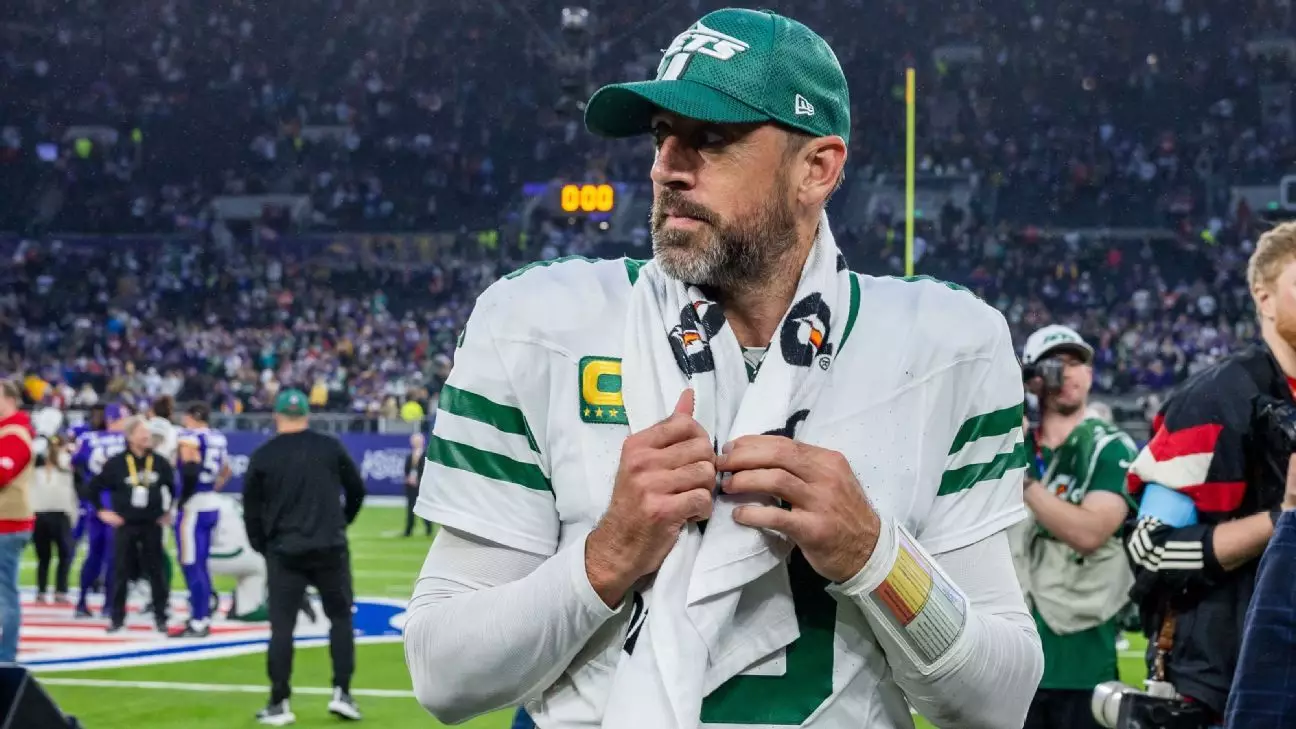The recent firing of New York Jets head coach Robert Saleh has sent shockwaves through the organization, shaking the very foundation of a team that once had high hopes for the season. At the center of the narrative is quarterback Aaron Rodgers, whose relationship with Saleh and presumed influence over team decisions have come under scrutiny. This uncommon upheaval highlights the complexities of leadership dynamics in professional sports, especially when expectations clash with reality.
In a candid moment on “The Pat McAfee Show,” Rodgers took the opportunity to refute claims that he played a role in Saleh’s firing, expressing his dismay at such assumptions. “I resent any of those accusations because they are patently false,” Rodgers asserted, signaling not just his loyalty to his coach but also his disapproval of the narrative framing him as a puppet master in the decision-making process. This moment underscores a broader theme: the scrutinizing gaze of the media and fans can often create misleading narratives that do not reflect the internal dynamics of an organization.
Rodgers’ swift defense could indicate his awareness of the power dynamics at play but may also serve as a means to protect the relationship he has built with Saleh. His comments suggest that despite potential rumors, he values integrity in relationships, something that may have been tested with ongoing speculation surrounding his role in the team’s performance and leadership decisions.
With the announcement of Jeff Ulbrich stepping in as interim head coach, Rodgers has pledged his support. This move, however, comes with the possibility of changes to the offensive coaching staff, creating an atmosphere of unpredictability. One of the potential casualties of this coaching shake-up could be Nathaniel Hackett, the offensive coordinator and a close ally to Rodgers. This brings an entirely different set of implications, particularly as Ulbrich considers strategies to improve the Jets’ performance.
Rodgers’ ability to adapt to this new reality, while remaining supportive of Ulbrich, speaks volumes about his professionalism. His willingness to embrace change reflects a commitment to team success—even if it means endorsing hard decisions that could personally affect his friends in the coaching staff. The importance of unity during challenging times cannot be overstated, and Rodgers’ message to the players emphasizes that the team as a collective entity must take responsibility for its performance.
Amid the turmoil, player reactions have ranged from shock to disappointment. Notable players like linebacker C.J. Mosley and offensive tackle Morgan Moses publicly expressed their feelings of disbelief at Saleh’s firing. The sentiment around the locker room indicates a broader concern about accountability and performance. Tight end Tyler Conklin provided insight into how the team members view the head coach: “A lot of us have talked about this as a production business, and… Coach Saleh ended up having to take the fall for that,” reflecting an acknowledgment that the team dynamics contributed to a collective failure rather than a singular coaching misstep.
The response from the locker room further emphasizes the necessity for introspection amongst the players. Accountability is often a double-edged sword, with leadership transitioning from a head coach to the players themselves. The variations in player reactions paint a vivid picture of a team grappling with its identity amid leadership change and challenge the narrative about what truly affects team performance.
The impact of Saleh’s dismissal extends beyond just immediate changes in coaching. This pivotal moment forces the Jets organization to reassess their values, strategies, and what it means to lead effectively in the NFL. For owner Woody Johnson, the decision to terminate Saleh was a solitary one, made after limited consultation. This solitary decision-making underscores the gravity of the situation for franchise leadership and poses questions about future directions in terms of coaching hires and philosophical orientations moving forward.
Furthermore, as the Jets prepare for a crucial match-up against the Buffalo Bills, the consequences of a coaching change cast a long shadow. The urgency to perform effectively compound with the necessity to augment team cohesion. A burden lies heavily on the shoulders of Rodgers and his teammates, who are now faced with the reality of turning around a season that many still believe can end positively.
The New York Jets stand at a crossroads, with Aaron Rodgers’ nuanced responses to recent events evoking deep reflection regarding responsibility in professional sports. As interim leadership takes shape, the outcome will not only define the rest of the season but also lay the groundwork for the future of this storied franchise. Moving forward amidst this uncertainty will demand resilience, accountability, and an unwavering commitment to team principles—qualities that every player, including Rodgers, will need to embody as they delve deeper into the challenges ahead.


Leave a Reply